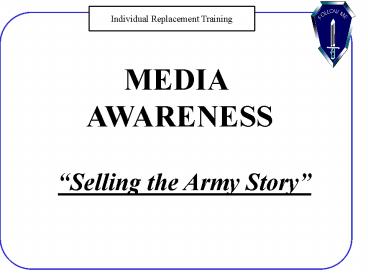MEDIA - PowerPoint PPT Presentation
1 / 24
Title:
MEDIA
Description:
CALL Newsletter, News from the Front, SEP/OCT 95. Individual Replacement Training ... Paint Word Pictures, Tell Stories. Use Notes. Individual Replacement Training ... – PowerPoint PPT presentation
Number of Views:2919
Avg rating:3.0/5.0
Title: MEDIA
1
MEDIA AWARENESS
Selling the Army Story
2
References
- FM 46-1, Public Affairs Operations, JUL 92
- FM 100-5, Operations, 14 JUN 93
- Training Plan White Paper, 1 FEB 94
- CALL Newsletter 92-7, Media and the Tactical
Commander - DEC 92
- CALL Newsletter, News from the Front, SEP/OCT 95
3
Risk Management and Reduction
- Hazard Identification
- Misrepresentation of the US ARMY
- Mission Accomplishment
- Risk Management and Reduction
- Hazard Misrepresentation of the US
Risk Assessment MEDIUM
- CONTROLS
- Situational Awareness
- Media Awareness
- Instruction
4
SELLING THE ARMY STORY
We OWE it to the American people, our soldiers
and their families, that their story and the
Armys story is told to the nationIF WE DO NOT
SPEAK FOR THE ARMY, OTHERS WILL. My goal is to
have the Army speak for the Army.
DENNIS J. REIMER GENERAL, USA Former Chief of
Staff
5
CHIEF OF STAFFS GUIDANCE
- Obligation to communicate to the world
- Positive, forward looking approach
- Train and Plan to provide Open Access to
- independent coverage by the media
- Units are Prepared to accept and Assist
accredited - reporters who are referred through the Chain
of - Command
6
CHIEF OF STAFFS GUIDANCE (Continued)
- NO compromising of operational security or force
- protection
- All Soldiers must be prepared to answer
questions - pertaining to his or her area of
responsibility.
DENNIS J. REIMER GENERAL, USA Former Chief of
Staff
7
Understanding the Media
- Dueling Agendas/Different Attitudes
- Spokespersons Bill of Rights
- - Know the Topic, Participants and Format
- - Know if it will be Live or Taped
- - Know if it will be Edited or Completely Used
- - Expect Fairness
8
Understanding the Media
(Continued)
- Spokespersons Unknowns
- - Interviewers Questions
- - See the Story in Advance
- - Change your Quotes or Story
- - Have Your View Being the Only One Presented
- - Expect to Hit a Home Run Every Time
9
Understanding the Media
Questions
Responses
Your Message
Media
Audience Interpretation
US Army in Peacekeeping Role
10
Media Characteristics and Tips RADIO
- Characteristics
- Emphasis on Voice Inflection and Pace
- Tips
- Be Engaging and Enthusiastic
- Paint Word Pictures, Tell Stories
- Use Notes
11
Media Characteristics and Tips Print Interview
- Characteristics
- Longer and More Detailed
- Chance to Provide Additional Information
- Possibly a More Knowledgeable Reporter
12
Media Characteristics and Tips Video Interview
- Characteristics
- Brief Short Answers are Critical
- Visual Emphasis on Appearance, Technique
- and Location
13
Media Characteristics and Tips Video Interview
- Video Interpretation
- Audience Information Receipt
- 55 Percent - Non Verbal (Visual)
- 37 Percent - Voice Tones and Inflection
- 7 Percent - Content
- -- Albert T. Mehrabian, Researcher
14
Set the Ground Rules
- Narrow Down the Topic of Discussion
- No Speculation
- No Information that Will Endanger Soldiers
Lives - You are Not Obligated to Answer Any Questions
15
Set the Ground Rules (Continued)
- You may End the Interview at Any Time
- Listen to Each Question
- Request Guidance as Needed
- Relax and Be Yourself in Front of the Interviewer
16
Conduct the Interview
- If YOU cant answer a question, explain WHY
- You are to Avoid Answers With the following
- - Future Operations
- - Rules of Engagement
- - Specific Numbers of Casualties
- - Troop Strengths, Numbers and Types
- of Equipment
- STAY IN YOUR LANE
- DONT SPECULATE OR LIE
17
Conduct the Interview
(Continued)
- Assume EVERYTHING is On The Record
- Be Polite, Treat the Media with Respect and
Expect the - Same from Them
- Think Ahead - Understand the Impact of Your
Response - Speak Plainly, Avoid Jargon
18
Conduct the Interview
(Continued)
- Listen and Clarify Before You Respond
- Keep Your Answers Clear and Short
- If You Dont Know the Answer, Say So
- Never Lie, If you Dont Know it Just Say So
- Correct Mistakes Immediately
19
Conduct the Interview
(Continued)
- Bridging and Blocking Phrases
- Bridging Phrases
- You May be Interested to Know
- I Think What Youre Really Asking Is
- That Speaks to a Bigger Point of
- Blocking Phrases
- It is Our Policy Not to Discuss_______
20
Conduct the Interview
(Continued)
- WHAT IF I BLOW IT???
- Tell the media to NOT use that answer or tape
- Inform your Chain of Command Immediately
- Ask for Help if you need it
21
Individual Replacement Training
FACT
Leaders and soldiers need to be aware the
Perception of an operation can be as important
to the success as the actual execution of the
operation.
22
Conduct of the Interview(Continued)
- Command Messages
- 1. People are responsible for the success of our
mission - 2. The ____ has some of the best and most highly
trained people in the world - 3. People are our most important asset
- 4. There is no substitute for excellence in
caring for people - 5. We are proud to participate in this mission
to save lives - 6. We are here because they need our help
- 7. This exemplifies our ability to perform any
mission...
23
Summary
- Media Guidance
- Understanding the Media
- Conducting the Interview
24
Conclusion
- Its Your Interview
- You Should Have Your Own Agenda
- You Should Deliver Your Message regardless of the
- Questions or Type of Media

